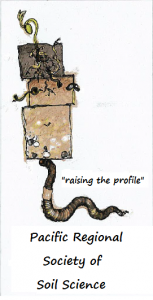A Summary of the Day
By Christian Evans
This year’s workshop was another step down the road the PRSSS traveled down last year with our exploration of soil testing and laboratory analysis. Entitled “Moving from the Lab Bench to a Standard Understanding Data under an Environmental Microscope”, it explored risk assessment, the testing of unconventional matrices, the current state of soil testing in BC, and the process of environmental standard development. As usual, the workshop finished off with a discussion on a related topic.
The first speaker was Lizanne Meloche, a Project Biologist with Golder Associates. Her talk was entitled “Risk Assessment of Contaminated soils”. Her overview of the risk assessment framework was a prelude to the “testing standards” theme brought up later in the day, and she offered characterizations of various risk exposure pathways for the endangering of human and animal life by contaminated soil.
The second speaker was Ruth McDougall, a Senior Agrologist. Her talk, “Testing Unconventional Matrices: Challenges in Interpreting Results” was an adventure through the variety of materials one might have to sample as an environmental consultant. One question which left a lasting impression was “how do you sample a cow?” (with respect to the use of slaughterhouse waste as a compostable material).
Following the midmorning break, Laura MacLean, an Environmental Standards Coordinator from Environment Canada, gave a talk titled “An Approach to Developing National Environmental Standards for the Agricultural Sector”. She described the progress on a study which looked at four main factors (air, biodiversity, pesticides, and water) on sites across the country with the object of creating environmental standards for things such as maximum allowable concentrations of pollutants or minimum required habitat for a given level of biodiversity. This talk was a lead in to the afternoon’s topics. As this year’s workshop was generously hosted by the School of Horticulture and the Institute for Sustainable Horticulture at Kwantlen University College’s Langley Campus, a one hour tour of the greenhouse was given by faculty and students after lunch.
The fourth and final speaker of the day was Dr. Grant Kowalenko, who presented “Challenges for Developing Soil Tests for British Columbia in a Changing World”. Dr. Kowalenko walked us through the history of soil testing in BC, from the days when the BC Ministry of the Environment oversaw all aspects to the present day where private industry has been the major player. The final portion of the workshop was a discussion led by Orlando Schmidt on the topic of whether moving towards a provincial standard for soil testing is possible. Many comments from members on the changes over the last few decades were heard, and benefits such as creating widely comparable data were cited as one of the reasons to institute a provincial standard. As a result of this discussion, an informal “Task Force on the Development of a Provincial Soil Testing Standard” was formed. Please stay tuned to the PRSSS for more developments on this front. The PRSSS wishes to thank Kwantlen Univerisyt College’s School of Horticulture and the Institute for Sustainable Horticulture for their generous hosting of this event.
Click on the links below to view slideshows of the day’s presentations:
- Challenges for developing soil tests for British Columbia in a changing world – Kowalenko
- Risk assessment of contaminated soils – Meloche
- National Agri-Environemental Standards Initiative – Maclean
- Assessing unconventional residuals for land application – McDougall
